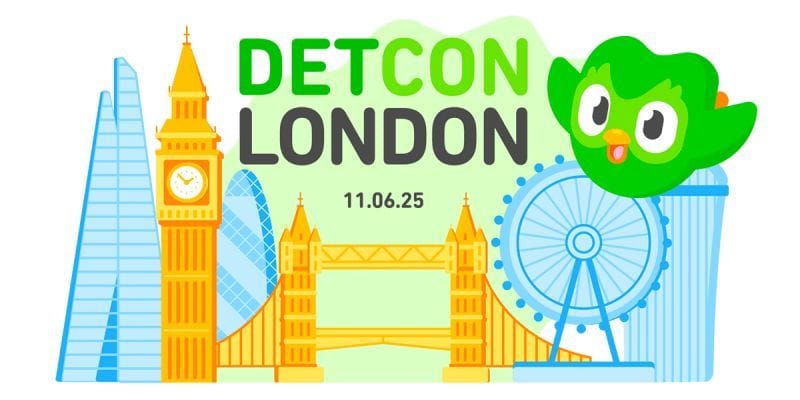On June 11th, the Duolingo English Test hosted our first-ever DETcon in London. Held at the University of London’s Senate House—once the Ministry of Information during World War II—this historic venue was a fitting backdrop for a day focused on resilience, innovation, and the global power of education. The message from the event was clear: Duolingo is here to stay.
More than 150 stakeholders from across the UK higher education sector joined us to explore the question: how can technology help us navigate an increasingly complex and unpredictable world?
Bookended by big ideas
We opened and closed the day with provocations from two former ministers: the Rt Hons Jack Straw and Rory Stewart. In a session chaired by Lord Walney, the Rt Hon. Jack Straw joined Dr. Laura Gilbert (Tony Blair Institute) for a wide-ranging conversation on technology and geopolitics. Dr. Gilbert shared a cautiously optimistic take on AI’s potential to relieve systemic burdens in sectors like healthcare and education, while insisting that trust must be earned—not assumed—by tech companies. “I think Duolingo does this well,” she added, applauding our transparency.
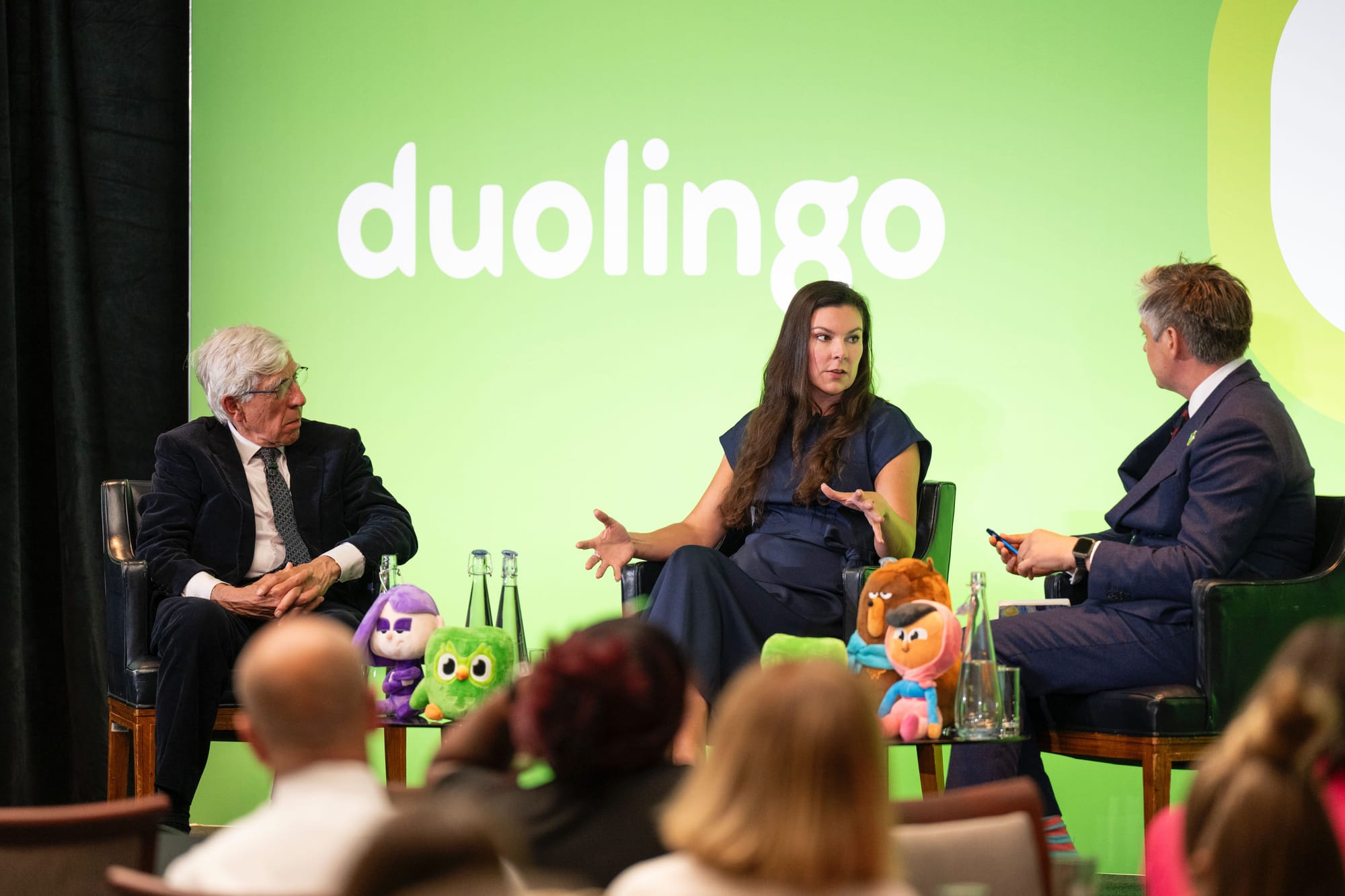
Rory Stewart closed the event in conversation with journalist Sonia Sodha. Drawing on his international experience as a former diplomat, MP, and current Yale professor, Stewart offered a sweeping analysis of today’s global volatility, encouraging UK institutions to find purpose and optimism amidst uncertainty. His endorsement of US higher education’s historical partnership with government as a driver of innovation and economic growth served as a rallying cry for protecting and strengthening public investment in education.
A sector reckons with change
Sessions throughout the day tackled the UK’s shifting higher education landscape. University leaders including Martyn Edwards (University of Leicester), Jamie Arrowsmith (UUKi), Anne-Marie Graham (UKCISA), Nick Hillman (HEPI), and Katie Layt (Enroly) addressed the political and regulatory pressures shaping international student recruitment—from new English language requirements to tighter compliance expectations and post-study work limitations.
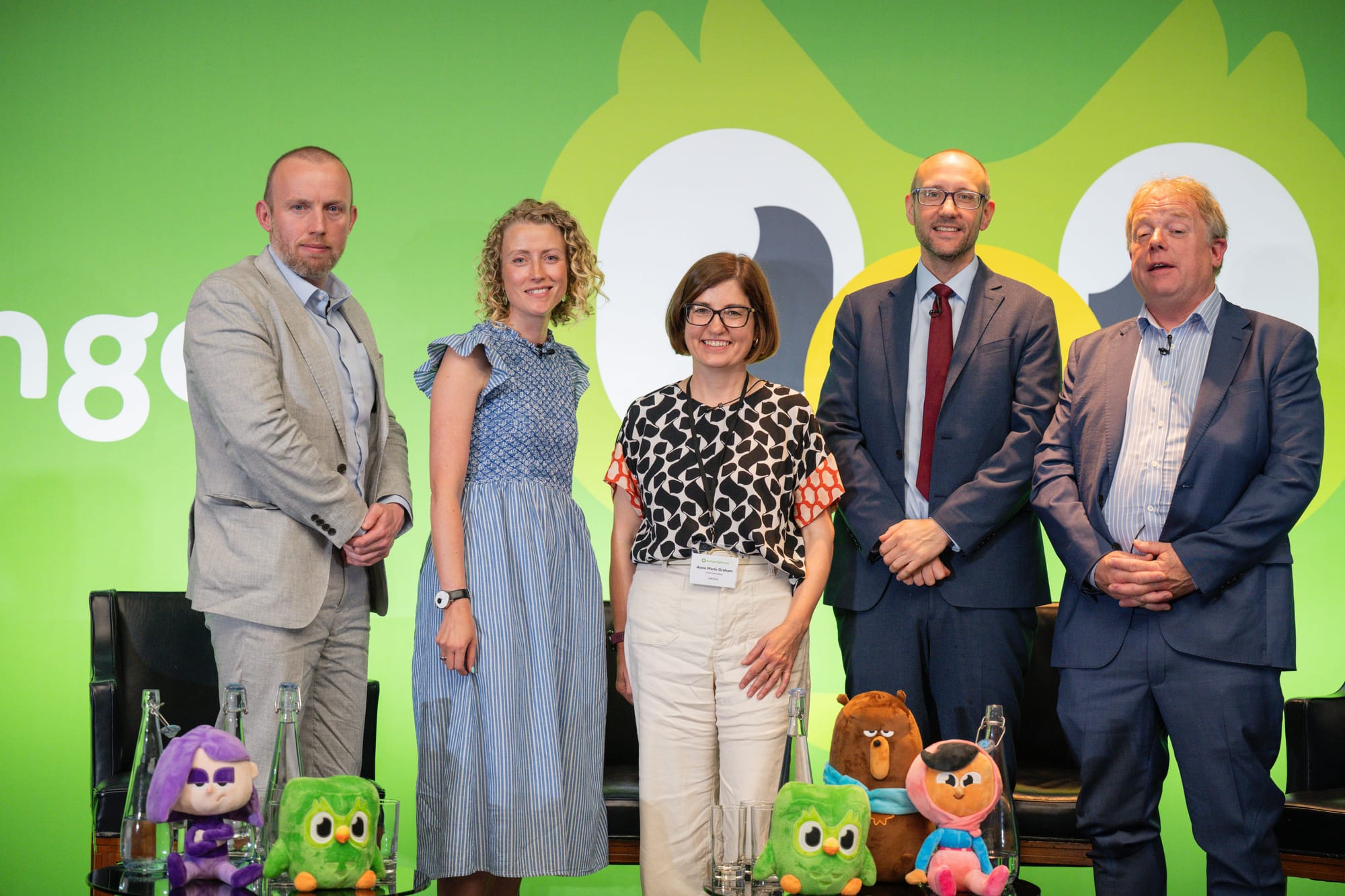
Speakers urged institutions to stay agile while preserving the student experience. Real-time data, streamlined admin tools, and digital-first assessments were framed not only as efficiencies but as necessities in a landscape where risk tolerance is shrinking and public trust is fragile.
Technology in action
The heart of the day’s theme—using technology to drive access and equity—came through powerfully in a fireside chat between Duolingo co-founder and CEO Luis von Ahn and Jen Dewar, Executive Director of Institutional Engagement. Luis spoke candidly about his journey from Guatemala to the U.S., and how the barriers he faced as an international student inspired the creation of Duolingo and the Duolingo English Test. His message was clear: when technology is used responsibly and creatively, it can dismantle gatekeeping systems and offer opportunity at global scale.
That message carried into the “Duolingo Incubator” session, where our team shared how we’re putting that vision into practice. TED-style power talks from Duolingo experts—including Klinton Bicknell, Alina von Davier, Ramsey Cardwell, Steven Nydick, and Michael Sobczak—highlighted how we’re building more secure, inclusive, and efficient assessments through adaptive testing, AI-generated content, and human-in-the-loop design.
Through these talks, we made the case that the future of English language assessment isn’t just faster or cheaper—it’s fairer, more reliable, and radically more accessible.
Climate counts too
We also unveiled the DET Carbon Report in partnership with the International Education Sustainability Group (IESG). The report compares the emissions generated by online English testing to traditional test-center models, and the results were stark. Online delivery, like the Duolingo English Test, produces up to 99% fewer carbon emissions—the equivalent of planning a sherwood forest each year!
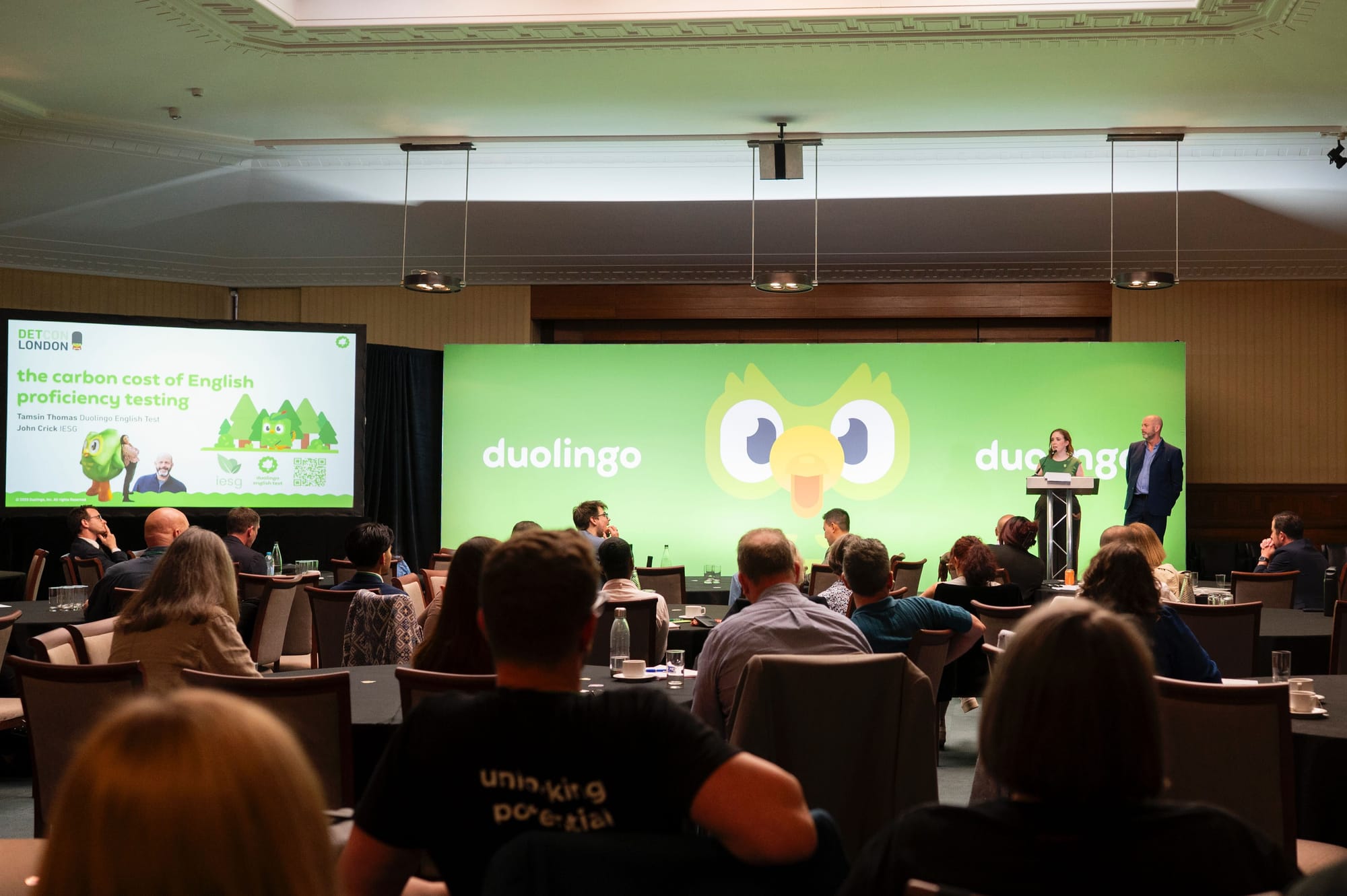
The analysis found that DET test takers have completed exams in more than 70,000 locations worldwide, including 46,000 sessions in countries without any test centers at all. In contrast, SELT test centers (used as a benchmark) are clustered in fewer than 500 cities globally. For many students, reaching a test center means traveling hundreds of kilometers. This means traditional testing is not only less accessible, but far more carbon-intensive.
This report reframes online testing as not just a matter of convenience or access, but of climate impact. As universities bring sustainability into admissions, they’ll need to reckon with the emissions embedded in their English testing policies. Choosing a digital-first solution like the DET is one tangible way to reduce institutional carbon footprints while expanding global access.
Celebrating access and impact
One of the most powerful moments of DETcon London came from Laura Kaub, Director of the Duolingo University Access Program. In a heartfelt closing, she highlighted how flexible, digital-first tools like the DET are helping refugee students restart their academic journeys—students who have faced displacement, conflict, and systemic barriers to education. Her remarks centered on a Congolese refugee scholar, raised in a camp in Zimbabwe, who will join Royal Holloway this autumn to study genetics—the first DET Scholar to be hosted by a UK university.
Laura’s call to action—"join us"—landed with urgency. As global challenges mount, UK universities have the chance to step up: by supporting fee waivers, accepting the DET more broadly, and creating space for students whose potential often goes unseen by traditional systems. These aren’t edge cases—they’re reminders of what equitable admissions should look like when access and excellence go hand in hand.
We also celebrated innovation in this space by announcing Dr. Fiona Ashmore from the University of Leicester as the winner of the DET University Challenge, recognizing a UK institution making bold moves to expand access through testing. As Fiona said in her recent article for the UKCISA blog, participating in the challenge "was a powerful exercise in bridging the gap between real life policies and the lived experience of our students."
From individual scholars to sector-wide initiatives, the day made clear that inclusive admissions aren’t just possible, they’re already happening. Now, it’s time to scale them.
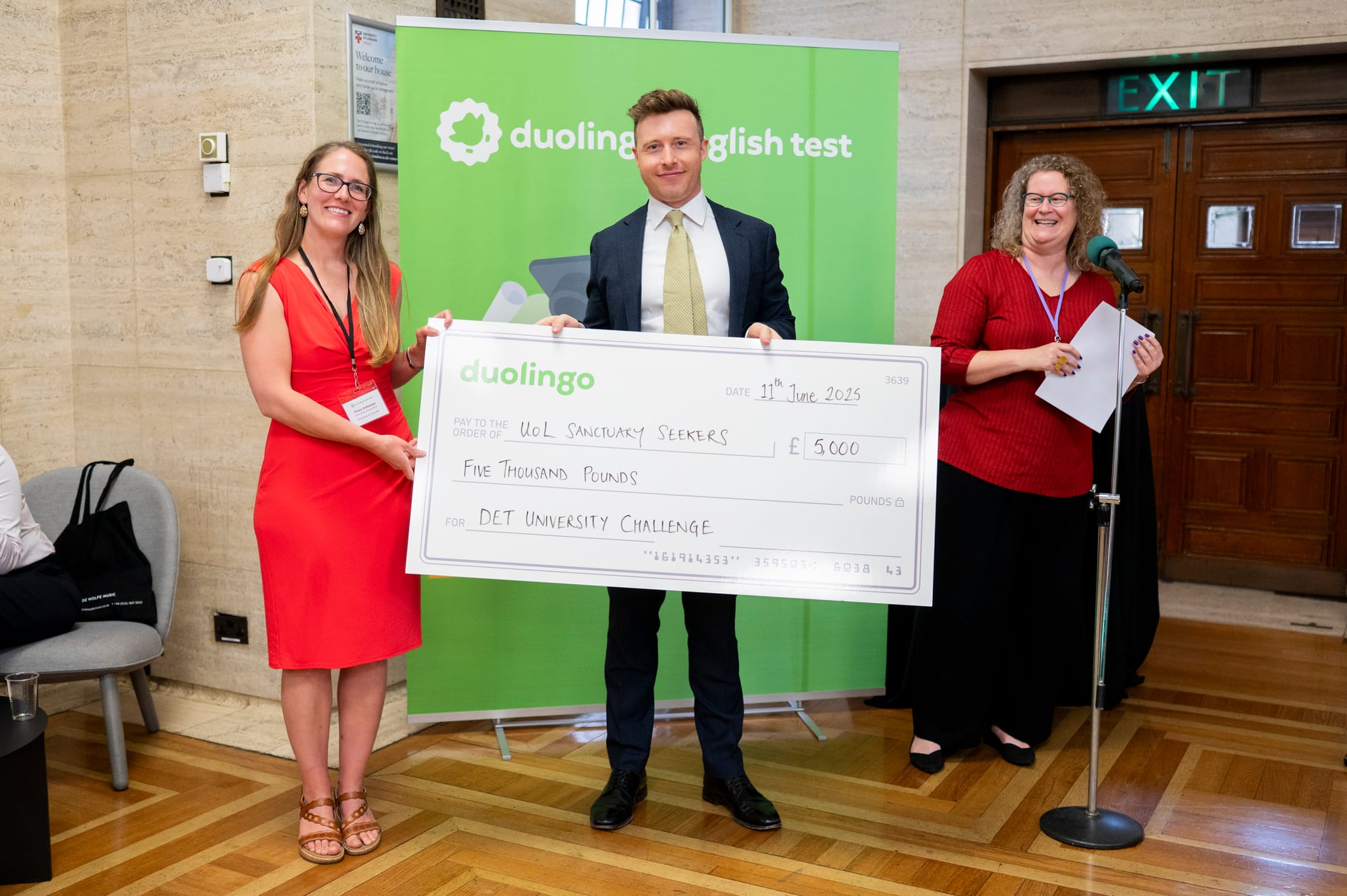
What’s next: The UK Welcome Project
We ended DETcon London by launching our DET UK Welcome Project, a summer campaign to support students whose study plans outside the UK have been disrupted. We’re working with education agents, running targeted campaigns, and offering discounted tests to help institutions connect with talented students still searching for options. Stay tuned for more!
A standout event for the sector
From headline speakers to hallway conversations, DETcon London was praised as “timely,” “thought-provoking,” and “a truly standout event for the sector.” More than just a showcase of Duolingo’s work, the day offered a space to reflect on what’s at stake—and what’s possible—when the education sector leads with courage, collaboration, and a clear-eyed embrace of technology.
